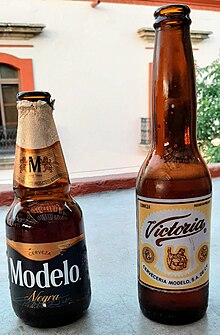
History of beer in Mexico dates from the Spanish conquest of the Aztec Empire. While Mesoamerican cultures knew of fermented alcoholic beverages, including a corn beer, long before the 16th century, European style beer brewed with barley was introduced with the Spanish invasion soon after Hernán Cortés's arrival. Production of this beer here was limited during the colonial period due to the lack of materials and severe restrictions and taxes placed on the product by Spanish authorities.[1] After the Mexican War of Independence, these restrictions disappeared, and the industry was permitted to develop.[2] Furthermore, the arrival of German immigrants during the ephemeral Second Mexican Empire of elected Maximilian I of Mexico, born an Austrian archduke, in the 19th century provided the impetus for the opening of many breweries in various parts of the country.
By 1918, there were 36 brewing companies, but over the 20th century, the industry consolidated until today, only two corporations, Grupo Modelo (now owned by AB InBev) and Cervecería Cuauhtémoc Moctezuma formerly known as FEMSA Cerveza (now owned by Heineken N.V.) control 90% of the Mexican beer market.[3] This industry is one of the most prevalent in the country, with over 63% of the population buying one brand or another. Beer is also a major export for the country, with most going to the United States,[4] but is available in over 150 countries worldwide.[3] In 2022, Mexico was the largest beer exporter in the world.
- ^ "Artes e Historia La cerveza en nuestro país" [Arts and History-Beer in our country] (in Spanish). Mexico: CONACULTA. Archived from the original on 2011-07-19. Retrieved 2009-11-21.
- ^ "La Cerveza en Mexico" [Beer in Mexico] (in Spanish). Mexico: Cervecería Cuauhtémoc. Archived from the original on 2003-08-08. Retrieved 2009-11-21.
- ^ a b "La history de la cerveza en Mexico" [The history of beer in Mexico] (in Spanish). Mexico: Explorando Mexico. Retrieved 2009-11-21.
- ^ "Vende México más cerveza" [Mexico sells more beer] (in Spanish). Mexico: Presidencia de la Republica. 2005-04-05. Archived from the original on 2016-03-03. Retrieved 2009-11-21.